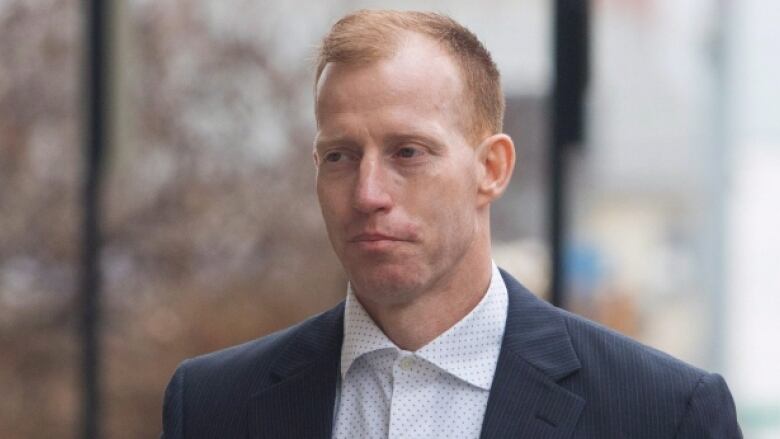Decision in Travis Vader case could come today
'I think it bodes ill for the judiciary if there is no mea culpa'

Court of Queen's Bench Justice Denny Thomas will hear arguments on a mistrial application today in the Travis Vader case.
And he could substitute Vader's murder convictions with manslaughter.
There's also the possibility Thomas will reserve his finding and issue a future written decision.
- Travis Vader lawyer calls murder conviction a 'colossal' error of law
- Crown asks for Vader manslaughter conviction
Vader was convicted on Sept. 15 of two counts of second-degree murder in the July 2010 deaths of Lyle and Marie McCann. The elderly couple disappeared more than six years ago on a road trip to British Columbia. Their bodies have never been found.
Explaining how he concluded that Vader was guilty of second-degree murder, Thomas said evidence from the lengthy trial proved Vader robbed and shot the couple. But he did not find the desperate drug addict intended to kill the McCanns.

To convict Vader, the judge relied on a section of the Criminal Code that was struck down in 1990 as unconstitutional.
That led to a defence application for a mistrial. Vader's lawyers called the judge's mistake in relying on the struck-down section "a colossal error" and insisted it could only be fixed by dropping the guilty verdicts and ordering a new trial.
"This court cannot proceed to impose a life sentence upon Mr. Vader for an offence that does not exist," the defence brief stated.
The prosecutor also acknowledged the Thomas verdict was reached with a legal error, but suggested the way out was to use the same evidence to reach a manslaughter guilty verdict.
A mistrial can be declared if there is reason to believe the judge can no longer make an unbiased decision.
However, prosecutor Ashley Finlayson wrote: "The Crown submits … there is no reasonable suggestion that the court is biased."
'I think you just own up to it. It was an error'
So far, Thomas has not acknowledged any legal error. At the beginning of October he told the lawyers: "It's important that this matter get dealt with. It's just a question of how we're going to do it."
University of Alberta law professor Peter Sankoff has watched the case closely. While on sabbatical in Europe, he viewed a livestream of the verdict being announced and was the first to cite Thomas publicly for using a Criminal Code section that no longer exists.
Now Sankoff is waiting to see if the judge will admit he made a mistake.
"I think it bodes ill for the judiciary if there is no mea culpa," Sankoff said. "There have been some people talking about judicial arrogance. I think you just own up to it. It was an error."
Sankoff said he would also like Thomas to publicly explain how the mistake was made.
"It would be useful for all of us who have been speculating about what's going on to see if there was a reason for it, and maybe something we can learn for future cases," Sankoff said.

Vader's lawyers also appear to be waiting for some sort of admission from the court.
In their written argument, they quoted a comment made in a 1974 Supreme Court ruling. "It is an exhibition of courage for a judge to admit his misgivings and change his position," the Supreme Court said.
Thomas will hear legal arguments on the mistrial application from the crown and defence between 9 a.m. and 2 p.m.
Last Friday, when he dismissed a media application to livestream his mistrial decision, Thomas said: "Whether I'll be in a position to deliver a decision on Monday is uncertain. It's likely I'll be delivering a written decision sometime after."
Sankoff predicts a manslaughter verdict is the most likely outcome.
"I just think it's the most logical conclusion," he said. "And the reason for that is because the manslaughter verdict is available on the conclusions the judge has already reached."
Vader could still face the equivalent of life in prison if he is convicted of manslaughter.

